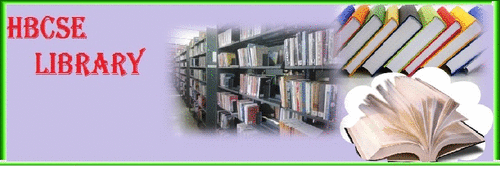June 2016
001.2 3163
Byars-Winston, Angela M. (2015). Culturally diverse undergraduate researchers' academic outcomes and perceptions of their research mentoring relationships. International Journal of Science Education, 37(15), 2533 – 2554.
001.4 3177
Hohensee, Charles (2016). Teachers' awareness of the relationship between prior knowledge and new learning. Journal for Research in Mathematics Education, 47(1), 17 – 27.
021.24 3155
Mukunda, Usha (2016). Unlocking shelves: fostering a culture of reading and
inclusion through open libraries. Contemporary Education Dialogue, 13(1), 157 – 165.
370 3170
Lofstorm, Erika (2015). 'I don't even have to be their friend!': ethical dilemmas
in Ph.D. supervision in the hard sciences. International Journal of Science Education, 37(15), 2721 – 2739.
371 3180
Sundaram, I. Satya (2016). Strengthening school education. New Frontiers in Education, 48(4), 50 – 58.
371.32 3157
Merttens, Ruth (2015). Textbooks from Shanghai and Singapore: a National Debate Plenary Lecture, Mathematical Association Conference 2015. Mathematics In School, 44(5), 3 – 8.
372.357 3156
Green, Carie J. (2015). Toward young children as active researchers: a critical
review of the methodologies and methods in early childhood environmental education. Journal of Environmental Education, 46(4), 207 – 229.
372.7 3174
Hourigan, Mairead (2015). Practical problems: using literature to teach statistics. Teaching Children Mathematics, 22(5), 283 – 291.
372.7 3175
Ponce, Gregorio (2015). Seeing the implications of zero again. Teaching Children Mathematics, 22(5), 292 – 299.
378 3181
Salim, M. (2016). Enrolment - employment linkages: a study on participation
of women in India's higher education and organized employment sectors. University News, 54(10). 19 – 23.
507 3159
Science and literacy in symbiosis: Special Issue. School Science Review, 97(359).
507 3160
Cheng, Meng-Fei (2015). Ivestigating the ralationship between students' views of scientific models and their development of models. International Journal of Science Education, 37(15), 2453 – 2475.
507 3162
Ucan, Serkan (2015). Social regulation of learning during collaborative inquiry
learning in science: how does it emerge and what are its functions? International Journal of Science Education, 37(15), 2503 – 2532.
507 3164
Zhang, Dongmei (2015). Disciplinary foundations for solving interdisciplinary scientific problems. International Journal of Science Education, 37(15), 2555 – 2576
507 3165
Dunn, Karee E. (2015). Understanding the influence of learners' forethought on
their use of science study strategies in postsecondary science learning. International Journal of Science Education, 37(16), 2597 – 2618.
507 3166
Matthews, Kelly E. (2015). Influence of undergraduate science curriculum reform on students' perceptions of their quantitative skills. International Journal of Science Education, 37(16), 2619 – 2636.
507 3167
Abd-El-Khalick, Fouad (2015). Development and large - scale validation of an instrument to assess arabic-speaking students' attitudes toward science. International Journal of Science Education, 37(16), 2637 – 2663.
507 3169
Morris, Bradley J. (2015). Analysis of data activities and instructional supports in middle school science textbooks. International Journal of Science Education, 37(16), 2708 – 2720.
507 3171
Liu, Ou Lydia (2016). Validation of automated scoring of science assessments. Journal of Research in Science Teaching, 53(2), 215 – 233.
507 3172
Mcneill, Katherine L. (2016). Pedagogical content knowledge of argumentation: using classroom contexts to assess high-quality PCK rather than pseudo-argumentation. Journal of Research in Science Teaching, 53(2), 261 – 290.
507 3173
Israel, Maya (2016). A Multilevel analysis of diverse learners playing life science video games: interactions between game content, learning disability status, reading proficiency, and gender. Journal of Research in Science Teaching, 53(2), 324 – 345.
507 3182
Science, technology, engineering, arts, and math STEAM: Special Issue. Science & Children, 53(6).
507 3185
Sanderfur, Conner I. (2016). Undergraduate journal club as an intervention to improve student development in applying the scientific process. Journal of College Science Teaching, 45(4), 52 – 58.
507 3186
Goonewardene, Anura U. (2016). Interdisciplinary approach to success for under-represented students in STEM. Journal of College Science Teaching, 45(4), 59 – 67.
507 3187
Verakde, Heather (2016). Undergraduate science students' attitudes toward and approaches to scientific reading and writing. Journal of College Science Teaching, 45(4), 83 – 89.
510 3178
Simon, Martin A. (2016). Participatory and anticipatory stages of mathematical
concept learning: further empirical and theoretical development. Journal for Research in Mathematics Education, 47(1), 63 – 93.
510.7 3176
Kitchen, Richard (2016). Educational technology: an equity challenge to the common core. Journal for Research in Mathematics Education , 47(1), 3 – 16.
530 3179
Venkateswaran, T. V. (2016). Making waves: scientists see gravitational waves. Science Reporter, 53(3). 14 – 22.
540.7 3158
Seery, Michael (2015). Putting chemistry in context. Education In Chemistry, 52(6), 16 – 19.
574.07 3161
Bergey, Bradley W. (2015). Teaching high school biology students to coordinate text and diagrams: relations with transfer, effort and spatial skills. International Journal of Science Education, 37(15), 2476 – 2502.
574.07 3183
Hyeborne, William J. (2016). To flip or not to flip? analysis of a flipped classroom pedagogy in a general biology course. Journal of College Science Teaching, 45(4), 31 – 37.
574.07 3184
Weasel, Lisa H. (2016). Deliberative pedagogy in a nonmajors biology course: active learning that promotes student engagement with science policy and research. Journal of College Science Teaching, 45(4), 38 – 45.
595.7 3168
Breuer, Gabriele B. (2015). Importance of being colorful and able to fly: interpretation and implications of children's statements on selected insects and other invertebrates. International Journal of Science Education, 37(16), 2664 – 2687.

